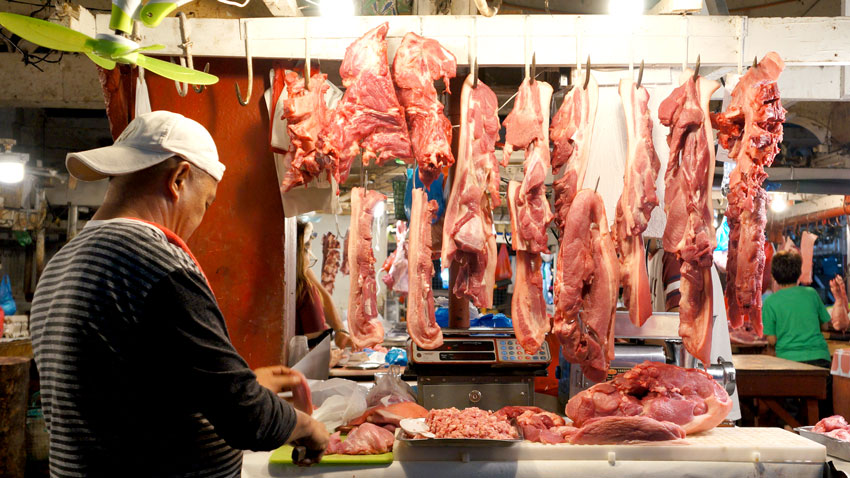
Vendors in Bankerohan Public Market said the high prices of farm produce from suppliers, plus the shortened period of operations, have made it difficult for them to make ends meet. (FILE PHOTO/davotoday.com)
DAVAO CITY, Philippines – Councilors raised concern over the rising costs of pork and other meat products in the market amid the COVID-19 pandemic and are seeking subsidy for hog raisers.
During Tuesday’s session, Councilor Pamela Librado-Morata during her privileged speech presented complaints raised during a dialogue held with vendors in the Bankerohan Public Market. Vendors said the high prices of farm produce from suppliers, plus the shortened period of operations, have made it difficult for them to make ends meet.
In the past few weeks, pork was sold in the market for more than P300 per kilo, the chicken price for almost P200 per kilo, while prices of vegetables and other commodities have also increased.
“The few who remain at work cannot make a significant profit due to the shortened time and the rising prices, especially of pork. Clearly, this situation has affected both consumers and vendors alike,” said Librado-Morata, who chairs the Committee on Labor in the City Council.
Consumers also shifted to online platforms to buy essential goods to minimize risks of COVID-19 but this have affected local market vendors.
Councilor Ralph Abella, who chairs the council’s agriculture committee, noted that the “rocketing prices” may benefit consumers in Luzon, it is affecting the local consumers and local businesses like small eateries or carenderia and restaurants.
“While it may be good to send our products to Luzon consumers who are buying at a much higher price than we have, we are compromising our very own supply causing our prices to go high. We have the supply and yet we are suffering from expensive prices of pork. We cannot enjoy what we actually have,” Abella said.
Librado-Morata also raised the problems of the Hog Farmers Association of Davao Inc. (HogFADI) saying that some hog raisers particularly from the backyard sector, “can no longer meet the demand of supplying pork products after their hogs were infected with ASF (African Swine Flu)”.
Early last year, Davao City was hit by the African Swine Flu (ASF) that affected several hog farms in various barangays. It was in August 2020 when the City Veterinarian Office declared the city ASF free. The outbreak cut down the pork supply down to around 30 to 40 percent.
Because of the culling of hogs, a significant number of hog raisers lost their livelihood. The organization also recommended to the Department of Agriculture to do selected culling of hogs to enable them to sell hogs that are negative with ASF in the market.
“Thus, there is a need to repopulate the hog industry, but it cannot be done if the source of the infection will not be detected, which will further deepen ASF’s already adverse impact on the hog industry,” she elaborated.
The councilor lobbied to the city government to provide temporary subsidies to market vendors affected. She also suggested that the city government can again buy products produced by local farmers and “sell them to a subsidized rate” similar to the time when there was a strict implementation of lockdown and tap portion of the P6.37 Billion Quick response Fund to help farmers and consumers.
“In our region and here in Mindanao, we need the government to provide sufficient subsidies to our farmers and traders. Hence, at the appropriate time, I will be filing the necessary resolutions calling on the Department of Trade and Industry (DTI) to investigate and regulate the prices of pork and other meat products and to update the public of such development,” she said. (davaotoday.com)
African Swine Flu, Bankerohan Public Market, Councilor Pamela Librado-Morata, COVID-19 pandemic, davao city, Mindanao









